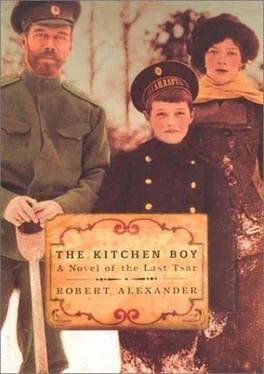“We understand,” he calmly replied, though I’m sure inside he too blazed with anger.
Yurovsky turned to leave, but rather than disappearing like a quick black cloud, he eyed the boy and descended upon him. I watched as the Emperor and Empress stiffened but said nothing.
“And how are you feeling today, Alyosha?” asked the komendant as he seated himself on the edge of the Heir’s bed.
Aleksei glanced at his parents before replying, “I am well, thank you.”
“Are you walking yet?”
“I have been able to stand, but not walk, not as of yet.”
Yurovsky, once a watchmaker, later a photographer, and still later a medic, loved to dole out advice, and said, “Well, you must get plenty of rest and eat lots of eggs and meat so as to get your strength up, agreed?”
Aleksei nodded with the grace of his father, though he said nothing further, for he was infused as well with his mother’s pride.
The Heir’s dog, Joy, came trotting in just then, and the komendant rose from the edge of Aleksei’s bed and gave the pup a pat on the head.
As he headed out of the room, Yurovsky said, “Well, I’m quite sure your four-legged friend here will watch over you.”
How did he do it? With blood on his mind, how did Yurovsky go about interacting with this husband and wife and these children? Da, da, da , once I made my grave error, it was this Komendant Yurovsky himself who went about so calmly orchestrating the execution. It was he as well who fired the first shot. And it was he who led the haphazard burial team off into the pine wood.
In any case, the minor incident with Yurovsky was soon overshadowed by hope, hope provoked by the final note that Sister Antonina and Novice Marina had just smuggled in. As with all the others, it too was in French, and it too survived those awful days:
The change in guards and in the komendant prevented us from writing to you. Do you know what the cause of this was? We answer your questions. We are a group of officers in the Russian army who have not lost consciousness of our duty before Tsar and Country.
We are not informing you in detail about ourselves for reasons you can understand, but your friends D. and T., who are already safe, know us.
The hour of deliberation is approaching, and the days of the usurpers are numbered. In any case, the Slavic armies are advancing toward Yekaterinburg. They are a few versts from the city. The moment is becoming critical, and now bloodshed must not be feared. Do not forget that the Bolsheviki will, in the end, be ready to commit any crime. The moment has come. We must act. Rest assured that the machine gun downstairs will not be dangerous. As for the komendant, we will know how to take him away. Wait for a whistle toward midnight. That will be the signal.
An Officer
And here I must ask, Is the wisdom of my years clear now? Have I not seen things that no human should?
“Wait for a whistle toward midnight…”
Such enticing words. To the ends of the earth Romeo could have thus enticed his Juliet, Heathcliff his Cathy, even Zhivago his Lara. Such promise lies in those words, such hope, such beauty. Aleksandra, herself, whispered how she hoped for three hundred loyal officers to come charging into town, whooping and hollering and whisking us all to safety. So excited, so agitated was she, that in those final days the Empress scarcely rested or slept, fidgeting and turning with every sound. The Tsar, meanwhile, never stopped pacing. In the dining room, in the drawing room, in the garden he paced his soldierly step, back and forth, back and forth, waiting, praying, hoping. And eventually despairing, for he understood that his fate, which had long been waiting on the horizon like a black storm, was finally and at last set to arrive.
True, just then and for a few days that followed, our candle of hope burned so bright, so strong. We found hope in everything, from the heavy evening rains that cooled the air, to our dinner table, which was spread with more plentiful food than we had seen for months.
The nights of July 5 and 6 we were again secretly advised to sleep fully clothed, which in fact we did. And again none of us slept well, listening as we did for that blasted whistle, which was never to come, not ever. I don’t know quite what happened, why this attempt to rescue the Romanovs never materialized. Perhaps the tsarist plot was discovered. Perhaps the officers lost their nerve. Perhaps their leaders were killed. Or perhaps they simply ran away with the pile of money sent by Anna Vyrubova. But something went terribly awry.
That night I lay on my bed, my ears stretching for midnight hope, yet only hearing the stomp of the guards outside and fighting cats and a woman screaming at her drunk husband.
“Borya, get inside at once!”
Once I was awakened by the report of a gunshot, a sharp blast that split the night. I sat up in my makeshift bed, a pile of blankets on the floor, and saw cook Kharitonov stir as well. Was this it, the beginning of the loyal officers’ siege upon our prisonly house? Were we about to be carried away by faithful Cossacks? But then there was nothing. Kharitonov just rolled over, tumbled back into sleep. And I just sat there, staring at the room’s lone window that was veiled in lime. The minutes crawled past, and I lay back down on the floor, overcome with a sense of hopelessness and eventually exhaustion.
Toward morning came the sound of war. And it increased every day from then on. Of course we could see none of this, not simply because of the double palisade surrounding The House of Special Purpose, but because of the limed windows. But like blind people we became particularly attuned to noises from beyond. Each time there came the sound of something momentous – the sound of hooves, the rumble of a motor lorry or two – a great pause passed through the house. The Emperor would cease his pacing, the Empress her secret stitching, Demidova her cleaning, and Kharitonov his chopping. What was that, a military or civilian wagon? Red soldier or White savior? Was it the time of our rescue or the time of…
We heard nothing more, not ever again, from these so-called Officers. The Empress became so nervous and the Emperor so frustrated, that he finally wrote a note begging for information. It was this note, entrusted to me by the Tsar and discovered by Yurovsky that provided the excuse the Bolsheviki had been searching so hungrily for.
But why was there no rescue? Why ? Earlier, that past winter in Tobolsk town, the Romanovs could have easily escaped. The troops assigned to guard them had been nearly all won over by the Imperial Family’s charm, and Nikolai could have effected escape by simply and quickly leaving town, fleeing to the great north and into the depths of Siberia. But the Tsar nobly felt an obligation not to stir up trouble, not to leave Russia, and so… so by the time they’d been transferred to that Red hotbed, the city of Yekaterinburg, it was too late.
But… but why did no rescuers appear by the light of the summer moon? By that July there were only several hundred Red troops in all of Yekaterinburg. The Whites, only twenty miles away, had seized towns all around and were poised to attack from any number of directions. We all knew the city was destined to fall any day. So why was nothing attempted? In those few days that followed there came through our single open window only tidbits of normal life and no whistle. Locked in The House of Special Purpose we waited. And as the time went by our hope fell away. It was on Thursday, July 11, that we finally realized just how desperate, even hopeless, our situation truly was.
To break the tremendous boredom, the Heir and I were once again playing, not troika or English tank, our two most favorite games, but elevator. One of the doors off the dining room was a pocket door that, much to our amusement, slid sideways in and out of the wall rather like an elevator’s. And Aleksei, seated in the wheeling chaise, and I, by his side, pretended we were riding all the way to the top of one of those new American buildings that rose so high above the ground – twelve floors! – and, they claimed, scraped the sky. We weren’t even to the fifth floor when we suddenly saw the grand duchesses and Dr. Botkin hurrying through the dining room.
Читать дальше












